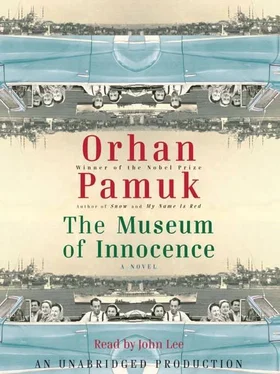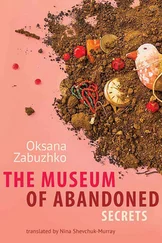The same girl would deliver us back the screenplay, rewritten and polished specially for Füsun, and accompanied by kind words of admiration (“My father says this is a real European art film”), but by then three more months had passed. Füsun met the delay with pouts and occasionally cross words, compelling me to remind her that her husband’s work had been just as slow.
Few opportunities to speak to Füsun privately, away from the table, occurred during my evening visits to Çukurcuma. But toward the end of each evening we would go together to Lemon’s cage to make sure the bird had enough food and water and some squid cartilage to peck on (I bought this in the Mısır Çarşısı, or Spice Bazaar). But this was hardly ideal, and we had to whisper.
From time to time an easier opportunity would present itself: When she wasn’t spending time with the neighborhood friends she hid from me (mostly unmarried girls or newlyweds), or going with Feridun to film haunts, or doing the housework, or helping her mother with the sewing work Aunt Nesibe still took in, she would go by herself to paint birds. She put it so prosaically, but I sensed the passion behind this amateur’s nonchalance, and her paintings made me love her all the more.
This hobby began when a crow landed on the ironwork balcony of the back room on the lower floor, a crow just like those that had landed on the balcony in the Merhamet Apartments: When Füsun approached it, the bird had not flown away. The crow returned on other occasions, and again instead of flying off it just sat there, staring at Füsun from the corners of its bright, scary eyes to the point of intimidating her. One day Feridun took a picture of the crow, a small black-and-white photograph I display here, which Füsun had enlarged for use as her model for a painstaking watercolor that I liked very much. She continued with a pigeon that came to perch on the same iron balcony, and then a sparrow.
On nights when Feridun was not at home, before supper or during a long commercial break, I would ask Füsun, “How’s your painting coming along?”
If she was in a good mood, she’d say, “Let’s go and have a look at it,” and we would go into the back room, which would be strewn with Aunt Nesibe’s sewing things, her cloth, and her scissors, and in the pale light of the chandelier we would study the picture together.
“It’s truly beautiful, very beautiful,” I’d say. My words were no less sincere for the unbearable longing I felt to touch her back, or just her hand. I’d been buying gorgeous “European-made” paper, notebooks, and watercolor sets from a stationery store in Sirkeci as offerings to her.
“I’m going to paint all the birds of Istanbul,” Füsun would say. “Feridun’s taken a picture of a sparrow. That’s next. I’m just doing this for myself, you know. Do you think an owl might ever perch on the balcony?”
“You should definitely mount an exhibition someday,” I said once.
“Actually, what I’d like to do is go to Paris and look at the pictures in the museums there,” said Füsun.
Sometimes she was irritable and downcast. “I haven’t been able to paint for the last few days, Kemal,” she’d say.
It was always clear that her low spirits were owing to the film’s delay: Not only had we failed to start filming; we’d not even managed to get an acceptable screenplay. Sometimes, having added almost nothing to a picture since the last viewing, Füsun would lead me into the back room to talk about the film.
“Feridun is so unhappy with Daktilo Demir’s rewrite, he’s doing it all over,” she said one night. “I told him myself, but you have to tell him, too: He can’t take too long on this. We just have to get this film of mine started.”
“I’ll tell him.”
Three weeks later we had again gone into the back room. Füsun had finished her crow and was now slowly painting the sparrow.
“It’s really coming along,” I said after admiring it for a long time.
“Kemal, I finally realize that it’s going to be months before we can start shooting Feridun’s art film,” said Füsun. “The censors don’t just wave that sort of film through; they’re slow and suspicious. The other day at the Pelür, Muzaffer Bey offered me a role. Did Feridun tell you?”
“No. So you’ve been going to the Pelür? Be careful, Füsun, those men are wolves, every last one of them.”
“Don’t worry, Feridun is careful about that, we both are. But this is a very serious offer.”
“Have you read the screenplay? Is this really something you want?”
“Of course I haven’t read the screenplay. If I agree, they’ll have a screenplay written for me. They want to meet me.”
“What’s the plot?”
“What difference does that make, Kemal? We’re talking about one of Muzaffer’s romantic melodramas. I’m thinking of accepting.”
“Don’t rush into this, Füsun. These are bad people. Feridun should go talk to them for you. They could have evil intentions.”
“What sort of evil intentions?”
I didn’t want to continue this conversation; I went back to the table.
I could easily imagine a skilled director like Muzaffer Bey using Füsun as the main attraction in a commercial melodrama and making her famous from Edirne to Diyarbakır. With her beauty and kindness, she was sure to enchant audiences-the truants, the unemployed, the daydreaming housewives, and the sex-starved single men-who packed into the airless cinemas that stank of the coal stoves heating them. It was not long before it occurred to me that if her dream came true and she became a star, she would take to abusing not just me but Feridun, too, possibly even leaving us both. I couldn’t bear to imagine her as the sort of woman who would ruthlessly manipulate magazine writers in pursuit of fame and fortune. But in the looks of the Pelür crowd, I saw a lot of people who would do anything to part “us”-and I use that word because it was the first to enter my mind. If Füsun became a famous film star, it would only magnify my love for her, and with it my fear of losing her.
Füsun’s cross looks persisted to the end of the meal, and knowing my lovely was thinking not about me or even her husband, I became anxious, then frantic. I had long since calculated that if Füsun were to run off with some director or famous actor she met at one of these bars, abandoning me and her husband, my pain would be astronomically greater than anything I’d suffered in the summer of 1975.
How much did Feridun understand the danger besetting us both? He must have been at least vaguely aware of the commercial producers plotting to carry her off to a distant, depraved world, the hazards of which I was at pains to remind him-in veiled language-while hinting that the art film would cease to have meaning for me were Füsun to degrade herself by playing in some dreadful melodrama. Back at home, drinking raki alone, in my father’s chair, I would wonder anxiously whether I had revealed too much.
At the beginning of May, as outdoor weather and the filming season approached, Hayal Hayati came to Lemon Films to tell us that a semi-famous young actress lay in the hospital following a beating at the hands of her lover, and that this unfortunate development also proposed a wonderful opportunity for a beautiful and cultivated girl like Füsun, but Feridun, now well aware of my misgivings, courteously declined the offer, and I don’t think he ever even mentioned it to Füsun.
60 Evenings on the Bosphorus, at the Huzur Restaurant
SOMETIMES THE things we were obliged to do to keep Füsun away from the wolves and jackals besieging her on our every visit to the Pelür were less a source of distress than of mirth and even of moral uplift. When, for instance, we had heard that the White Carnation, the gossip columnist readers will remember from my engagement party at the Hilton, planned to write a piece about Füsun, in the “a star is born” genre, we concocted copious evidence of what a cad he was, and so she conspired with us to avoid him like a leper. When a journalist and self-described poet sat down at our table to inscribe a poem that had welled up from his innermost parts, and sweetly dedicated the inspiration to Füsun, I managed to ensure the timeless ode would not outlive that moment or have a single other reader by furtively instructing the elderly waiter Tayyar to toss it in the trash. Later, when Feridun, Füsun, and I would find ourselves alone after such episodes, we would merrily compare notes, and, although each of us withheld details according to his or her purposes, we would laugh in genuine complicity.
Читать дальше












